34 Years and Counting
The other day was the 34th anniversary of my arrival here in Indonesia. Back when I wrote a lot (before I started making videos), I used to do an annual reflection on why I am still here. Maybe it’s time to start doing that again.
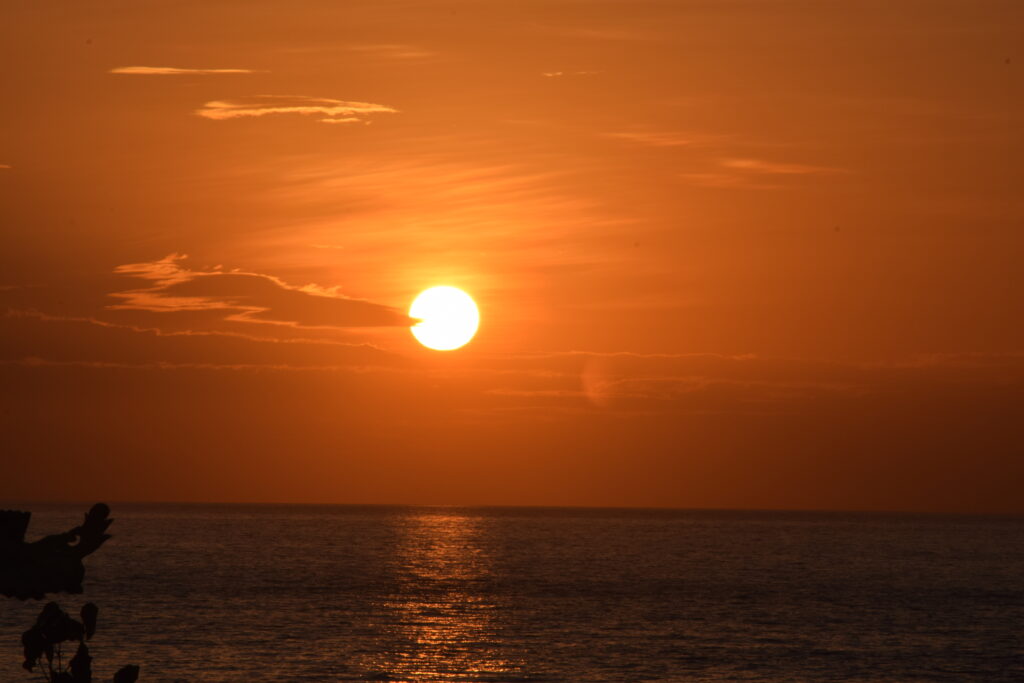
I hadn’t realized how long it’s been since I stopped writing and started making videos. The last post here was 4 years ago. How much things have changed since then: The Pandemic. Changed. Everything. The world shut down. Conspiracies theories ran rampant. The masked vs the unmasked. Vaccines. Numbers. I made a video on a YouTube channel that I have where I published blurry videos of the kids and of Singaraja. I mentioned the pandemic in one video, which wasn’t called a pandemic at the time. And some people who weren’t family members watched the video and then the next one where I talked about the pandemic again. Eventually I went from a dozen or so subscribers to the 1,900 or so that I have now. The YouTube channel was meant purely as an archive for the family of important ceremonies or celebrations. It’s changed now were it’s primarily a news channel with the occasional video of family events, such as marriages and birthdays. And the occasional video of me wandering around Singaraja talking about the kampungs and banjars.
But, I was never particularly interested in making videos; I’ve always been more interested in writing. I started writing on my own website back in the late 90s. Most of those essays have been lost. But here, I have a few posts dating back to 2016. That seems like an eternity. 7 years.
So, I was asked the other day in the comment section on the YouTube channel how I came here and why I stay here. How did I get here is a complicated story and one for another post. Today, I’m going to repost something that I wrote 7 years ago. It’s my look at the good and the bad about living here. Reading over this, I see some positive changes like in healthcare, corruption and visa problems. Some other issues that were a problem 7 years ago are still a problem. Things change, but they change slowly. So, here it is.
Why I Am Still in Bali
I’ve been thinking about the question that is posed to me now and again about why I live in Bali. I was just reading some comments on an expat forum where several members were discussing how much they disliked Bali now after living here for some time, with one writer being literate enough to sum it all up as “Bali sucks.” OK, the emotion there was pretty clear, and the frustrations that expats sometimes feel here aren’t just made up: there are lots of frustrations to life in Bali that can wear on people like traffic, corruption, visa problems, the education system, lack of an infrastructure sufficient for the population size, poor health care, scam artists and on and on. The issue is how to deal with these frustrations of everyday life, if indeed someone wants to deal with them at all.
First, the idea that Bali is paradise is absolutely poison. People that move here with that mindset (and I know many who have and few of those who are left) are setting themselves up for disappointment. Paradise is an emotionally loaded word. Now I sometimes use the word in relation to Bali, but usually somewhat ironically, and that may be why I’m still here and why I’ll stay. Let’s look at a few of the problems and see how they pan out when we look outside Bali.
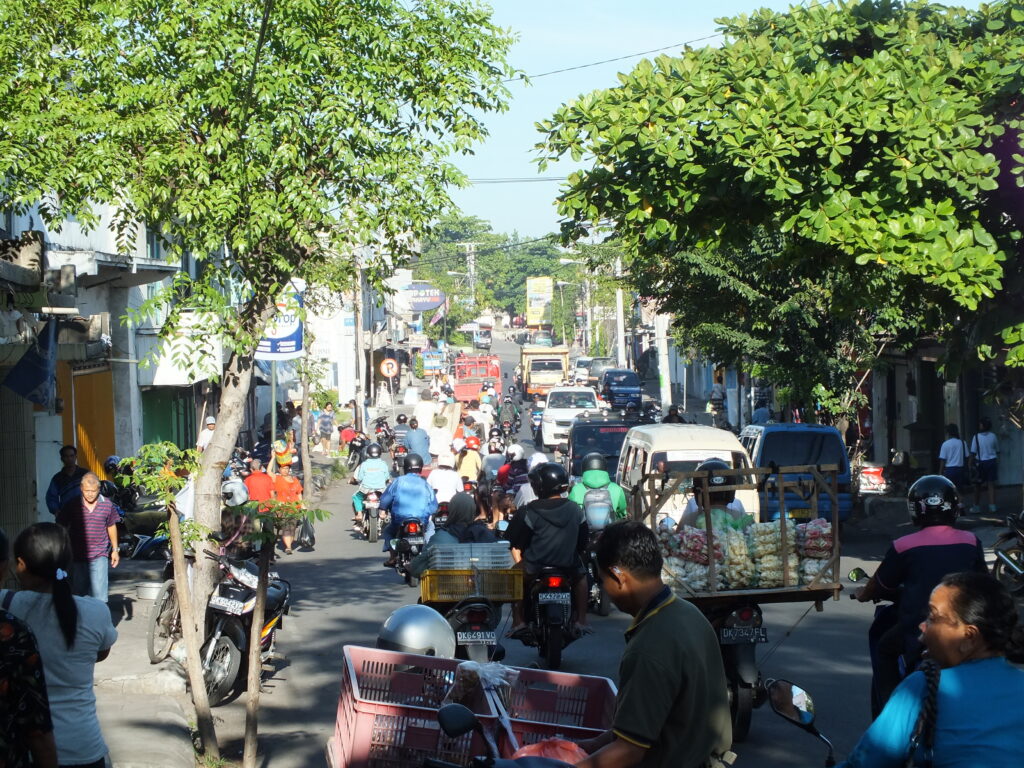
The Negatives
- Traffic: True, traffic has become a nightmare in parts of the island. Try driving down Jalan Legian during the day and watch the folks on foot pass your car. But, I distinctly remember rush hour drives into Chicago and San Francisco when I thought that I’d never get to work. I get around the traffic problems by staying out of the main population areas unless absolutely necessary. If someone wants to live in Kuta, then it’s necessary to accept the traffic situation. Someday the Balinese authorities might develop a plan to deal with too many vehicles on roads that are too narrow, but probably not while I’m still on this planet.
- Corruption: Dealing with some officials means being ready to either stick to your anti-corruption guns and being prepared to wait for a while for your documents, or you can hand over a little “uang rokok” to speed up the process. I grew up in Chicago and bribes and handouts to cops and judges and building inspectors were a way of life, just like it is here. You can go along with the system or buck it in either place. It’s all up to you. To say that Bali has the market cornered on corruption is to say that you haven’t seen how things work anyplace else. I think that things are getting better rather than getting worse, but that’s just my perception.
- Visa problems: Yes, these are definitely a pain. Expats have more options than before though; the problem is figuring out exactly what the details of these options are. Another case of things getting better rather than things getting worse.
- Education: Even the government admits that there are problems with the education system here. Some teachers, administrators and government officials are working to reform the system. I keep looking forward to the day when teachers are paid a decent salary and given the professional development and support necessary to improve the system. Take a look at the United States education system and you see a lot of the same problems and a lot of the same mistakes being made in regard to standardized testing, government interference and such. The efforts of the Texas Board of Education to rewrite history is just one example of how badly things are going in the U.S.
- Infrastructure problems: Too many people, too many hotels, too many swimming pools, too many vehicles, too many villas. Not enough water, not enough electricity, not enough space on the roads. This may change eventually when enough people with vision are elected to run the government. Again, it will probably not happen on my watch, but I keep hoping it will for my kids and grandkids.
- Healthcare: Bali is missing the boat by not getting in on medical tourism. I just talked to a Chinese/Indonesian friend who is on her way out to Singapore for an operation. 200 million plus. If you’ve ever been in Bumrungrad Hospital in Bangkok, you know how lucrative this business is. There are beginnings here to developing an international class of health care, but there’s still a long way to go. I haven’t figured out what I’m going to do if I get seriously ill again, but it sure won’t be spending 200 million in Singapore.
- Scam artists: It seems that I read more and more stories about expats, especially newbies, being tricked out of money usually over property transactions, but also over marriages where the local spouse is more interested in love than money. It’s always sad to read these stories, and I’m not one for blaming the victim, but sometimes folks just lack common sense (after all, how many of us didn’t behave like starry-eyed teenagers when we first came here). Potential expats need to do their homework and get information before they commit to moving here. And check, check, check. There is a lot of incorrect information on some of the forums. Newbies still use the “nominee” system for “buying” land, but the government has already come out in the press and said that they consider it illegal. Why would you give someone a huge chunk of money to do something that is, if not illegal, certainly on the margins of legality? We’ve all been through the “he’s just like my brother” phase of life here, especially before we actually settle down. I wouldn’t give my brother $150,000 to buy a house for me and hope that he would let me live there forever. And as far as legal documents go, well, that’s another story.
Those are the negatives. They’re irritating, but manageable. What’s the balance?
- Family. Most of my family is here. I’d like to see the ones in the States, but health and travel costs are constraining factors so I have to content myself with emails, Facebook or Skype. My family here loves Indonesia and Bali, and that’s one thing that keeps me living here. My children will probably want to move on to explore new areas eventually, but this will always be home, and my wife and I will be here to welcome them back.
- Smiles. Sounds syrupy-sweet enough for me to choke on it, but on my way back from Ubud earlier this week, I drove up through Kintamani and down to Singaraja from there. As I drove through the villages along the road, lots of smiles and waves. They had nothing to do with insincerity or wanting something for nothing. These were folks who were never going to see me again. They were just being friendly and that’s worth a lot in this world.
- Family and community life: People take care of each other, show concern for each other, and can usually be counted on to help when help is needed. I know that my children will take care of me some day if I become too ill to get around or too senile to be useful. No nursing homes, no visiting one day a month. Elderly people are still respected here, just as little ones are too. Walking down the street in my poor kampung is always a pleasure just because of the little exchanges and pleasantries that make life comfortable. A lot of my neighbors are poor as can be, but it doesn’t effect their innate human dignity or their delightful sense of humor.
- The physical beauty of the island: Just driving up through the Ubud area to Kintamani and down to Singaraja offers enough breathtaking vistas to satisfy me for weeks. Over developed or not down south, this island is still gorgeous and the scenery is all free.
- Pace of life: Sometimes the “tomorrow” or “soon” answer to getting something done can be irritating, but the flexibility of time is something that, as I’ve written about so many times before, I’m learning to accept and appreciate.
- The sound of the sea: I live seaside and for a lover of seas and oceans that alone is enough to keep me here forever. I love being able to snorkel in front of my house. I love watching the neighborhood kids line up along the sea wall trying to catch small fish.
- The weather: The heat and dryness up in Singaraja keep my old battered bones from aching more than they would if I lived in a cold climate.
- Religion/spirituality: Actually this is a complaint that a number of expats have about living here. Religion is an integral part of life for most everyone that lives here. Foreigners need to learn to accept that.
- Cost of living: OK, let’s be practical. Life is cheaper here than in the States. Cost of living continues to rise in Indonesia, but it’s still a long way from what it would cost us to live in the States. I’m retired now. That would never have happened in America. I want a chance to take some time, reflect on life, enjoy my kids, fool around with my pets, and read and write to my heart’s content.
So, another of my annual posts on living in Bali. Who knows what next year will bring.





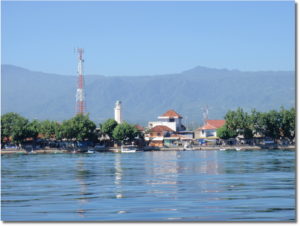
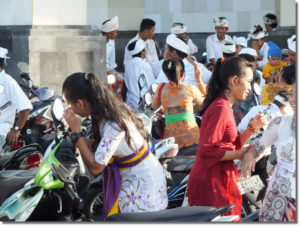 The answer is that there is no answer – it all depends on what you bring to Bali and where you take it. There are foreigners who have come to Kuta and have never left. The excitement, opportunity and midnight rush have seduced them into finding a way to build a life there. Sanur, a twenty minute ride from Kuta, is a more relaxed village catering to generally more upscale tourists. Then, too, there are the tourists who come and drink, dance, spend and flee looking for one more country or island to “do.” Come up to the north and you might find boredom or bliss. Quiet sunsets on Lovina or Anturan Beach, serene walks in scenic villages. Try Ubud, the fabled center of Balinese ‘culture,” and you may find fantastic artists and musicians, thrilling performances of ancient dances and plays, or you may find digital nomads wandering the street half-naked, rabid dogs, muddy pathways and cold showers.
The answer is that there is no answer – it all depends on what you bring to Bali and where you take it. There are foreigners who have come to Kuta and have never left. The excitement, opportunity and midnight rush have seduced them into finding a way to build a life there. Sanur, a twenty minute ride from Kuta, is a more relaxed village catering to generally more upscale tourists. Then, too, there are the tourists who come and drink, dance, spend and flee looking for one more country or island to “do.” Come up to the north and you might find boredom or bliss. Quiet sunsets on Lovina or Anturan Beach, serene walks in scenic villages. Try Ubud, the fabled center of Balinese ‘culture,” and you may find fantastic artists and musicians, thrilling performances of ancient dances and plays, or you may find digital nomads wandering the street half-naked, rabid dogs, muddy pathways and cold showers.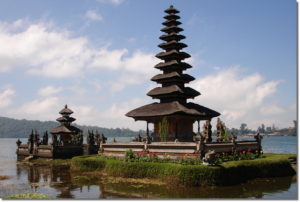 Bali. I first heard of the legendary Indonesian island during my freshman year at the University of Illinois in my Introduction to Cultural Anthropology course. Years later, I was a teaching associate in the anthropology department at UC Berkeley teaching an introductory anthropology course with Bali as one of the culture areas. And, while I had never been to Bali, my readings and lectures lit the desire to visit this island about which so much had been written just to see what the fuss was really about. As these things sometimes go, not long after I was offered a teaching position in a mining company on the island of New Guinea – not all that far from Bali. The fulfillment of my desire was just on the horizon. When I left San Francisco in 1989, I never imagined that I would still be living overseas 28 years later. As the Grateful Dead say, it’s been a long, strange trip.
Bali. I first heard of the legendary Indonesian island during my freshman year at the University of Illinois in my Introduction to Cultural Anthropology course. Years later, I was a teaching associate in the anthropology department at UC Berkeley teaching an introductory anthropology course with Bali as one of the culture areas. And, while I had never been to Bali, my readings and lectures lit the desire to visit this island about which so much had been written just to see what the fuss was really about. As these things sometimes go, not long after I was offered a teaching position in a mining company on the island of New Guinea – not all that far from Bali. The fulfillment of my desire was just on the horizon. When I left San Francisco in 1989, I never imagined that I would still be living overseas 28 years later. As the Grateful Dead say, it’s been a long, strange trip.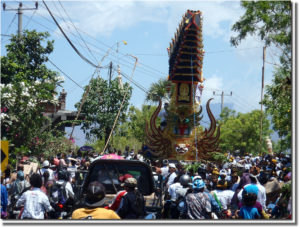 Being one of the old-timers now on the island, I tend to get lulled into thinking about how much better the island was before tourism boomed – there were plenty of tourists when I first came here, but every year the numbers go up and in some parts of the island – Ubud and the Kuta/Legian/Seminyak area in particular – high season just means even more tourists than usual. We like to talk about the adventure that life here was back then when many places still had no electricity, it was more common to drink warm beer than cold, streets in the villages would turn into streams of mud during the rainy season, and you never knew what strange thing you might find around the next bend in the road.
Being one of the old-timers now on the island, I tend to get lulled into thinking about how much better the island was before tourism boomed – there were plenty of tourists when I first came here, but every year the numbers go up and in some parts of the island – Ubud and the Kuta/Legian/Seminyak area in particular – high season just means even more tourists than usual. We like to talk about the adventure that life here was back then when many places still had no electricity, it was more common to drink warm beer than cold, streets in the villages would turn into streams of mud during the rainy season, and you never knew what strange thing you might find around the next bend in the road. 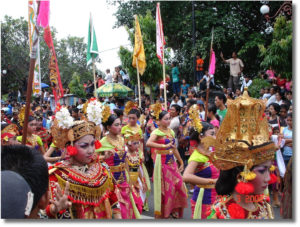 Thinking about the lost, the real and the imagined Bali.
Thinking about the lost, the real and the imagined Bali. 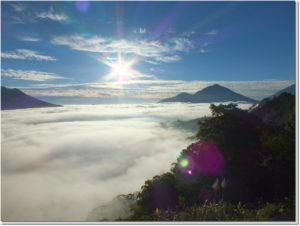 So why have I stayed in Bali and not gone back to the States or off to another country around the world? Serendipity is one short answer. A close American friend and long-time Bali resident has the saying: many are called, few are chosen. Without getting overly mystical, I felt a pull here within the first month that I was here. Not as soon as I arrived; I stayed my first week in Kuta and while it was a welcome break from life in the mining camp where I lived, it was not what I had hoped to find here. But slowly over the month of my vacation my perception of Bali developed. It was a combination of the natural beauty of Bali and the friendships that I developed with Balinese. It happened when the giddy edge of exotic strangeness started to wear off and a feeling of normality set in. It was then that I realized that I wanted to live here permanently. It wasn’t cheap living, it wasn’t being able to build a “villa,” (never been there, never done that), it wasn’t having a “staff” to cater to my every need, it wasn’t even because of a woman (I had already set my mind to living here permanently before I met the lovely Suhana). It was that mystical something that drew me here and keeps me here.
So why have I stayed in Bali and not gone back to the States or off to another country around the world? Serendipity is one short answer. A close American friend and long-time Bali resident has the saying: many are called, few are chosen. Without getting overly mystical, I felt a pull here within the first month that I was here. Not as soon as I arrived; I stayed my first week in Kuta and while it was a welcome break from life in the mining camp where I lived, it was not what I had hoped to find here. But slowly over the month of my vacation my perception of Bali developed. It was a combination of the natural beauty of Bali and the friendships that I developed with Balinese. It happened when the giddy edge of exotic strangeness started to wear off and a feeling of normality set in. It was then that I realized that I wanted to live here permanently. It wasn’t cheap living, it wasn’t being able to build a “villa,” (never been there, never done that), it wasn’t having a “staff” to cater to my every need, it wasn’t even because of a woman (I had already set my mind to living here permanently before I met the lovely Suhana). It was that mystical something that drew me here and keeps me here.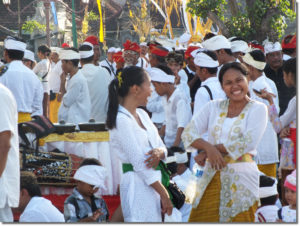 We imagine what we’d like to see when we travel. In the days before social networking, smart phones and instant images that can be transmitted across the globe in seconds, tourists would develop mental images of what they might meet upon entering a foreign country, then those imagined images would be adjusted to the reality. Now we can see our hotel room online, read updated reviews of the restaurant, check out the toilet facilities, see who our neighbor is going to be on the airplane, view anything and everything in a 360 degree total surround sound view. Traveling around to exotic locales isn’t what it used to be in terms of adventure, but for those of us who have been around this tropical “paradise” for a long time, we need to remind ourselves that others arrived here before us and said pretty much the same things that we say now. We just need to remember that the beauty of the island is not just in a startling sunset or a lush paddy but in the dignity and strength of the people that live here.
We imagine what we’d like to see when we travel. In the days before social networking, smart phones and instant images that can be transmitted across the globe in seconds, tourists would develop mental images of what they might meet upon entering a foreign country, then those imagined images would be adjusted to the reality. Now we can see our hotel room online, read updated reviews of the restaurant, check out the toilet facilities, see who our neighbor is going to be on the airplane, view anything and everything in a 360 degree total surround sound view. Traveling around to exotic locales isn’t what it used to be in terms of adventure, but for those of us who have been around this tropical “paradise” for a long time, we need to remind ourselves that others arrived here before us and said pretty much the same things that we say now. We just need to remember that the beauty of the island is not just in a startling sunset or a lush paddy but in the dignity and strength of the people that live here.
